ORANGE SLICES
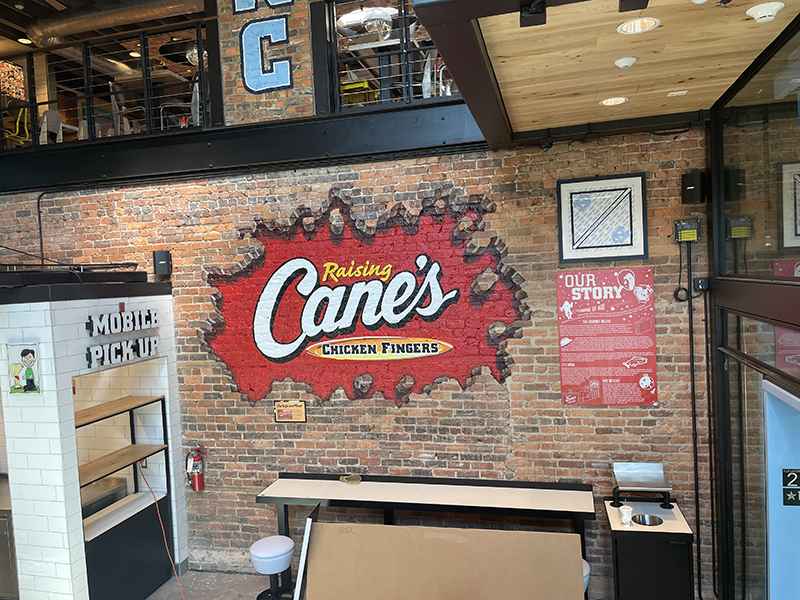
There is a reason that every Raising Cane’s restaurant has a mural.
Small towns, no matter how big they become, always have a heart. It’s easy to find, too, because it’s marked by an X: the crossroads, where the two main thoroughfares meet. For Chapel Hill, that’s the intersection of Columbia and Franklin Streets.
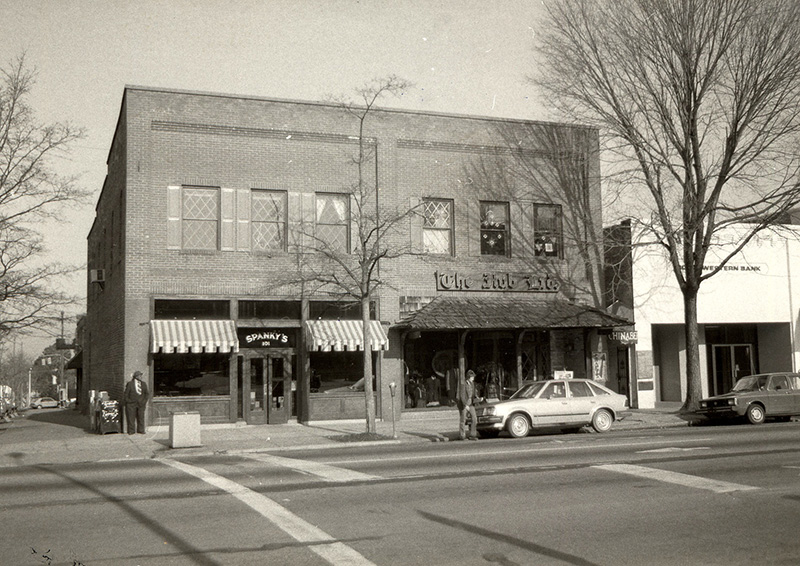
Spanky’s, Chapel Hill,1980s.
Walking as a mere pedestrian from one side of the street to another is like walking across a bridge through time. The men and women who created this town and this university walked these same streets; Thomas Wolfe, exploding with ideas, was here too. And the streets are still subtly scorched from bonfires celebrating UNC’s sports victories, with more fires to come. Though the intersection itself and the original buildings surrounding it may remain, and they do, what occupies them does not.
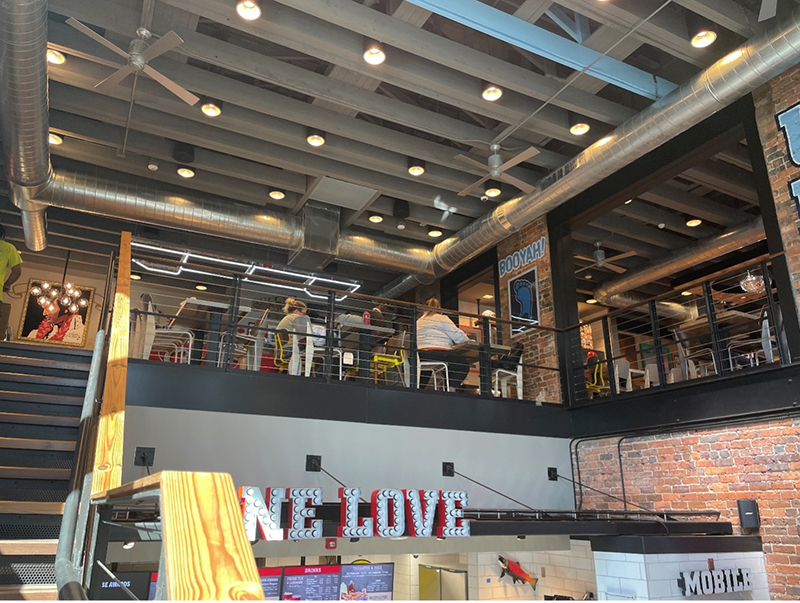
The building that for years housed Spanky’s Restaurant (1977-2018) has a new tenant, Raising Cane’s. They’re new, but the building they’re in is old. It was built by Andrew Jackson Brockwell, entrepreneur and property developer, way back in 1902. The building is still known as the Brockwell Building and is made from handmade bricks, formed from the clay removed to make Columbia Street. Sloan Drug Company occupied the space from 1948-1974. Sloan Drugs was a place where you could sit at a real soda fountain, buy sundries, and even use a “free” telephone. Imagine. Old timers still refer to it as “Sloan’s Corner.”
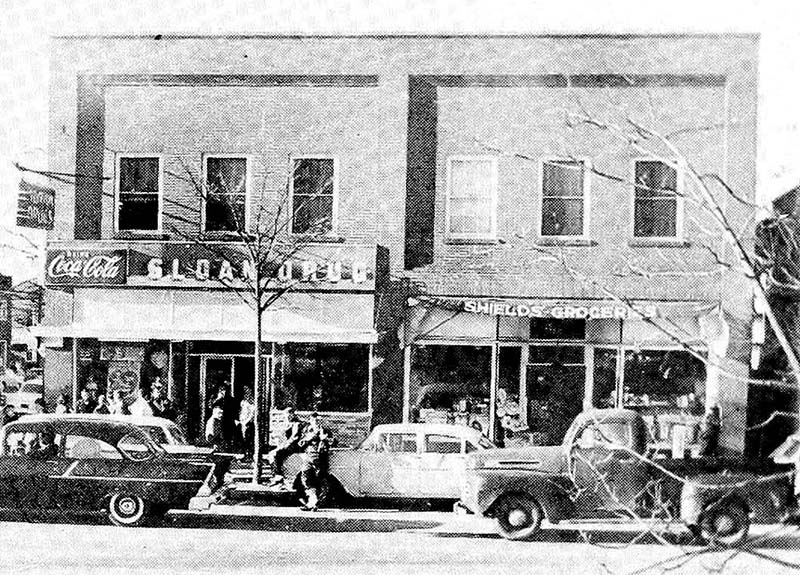
Sloan Drug Store,1961.
Brockwell’s daughter, Fanny, left the building to Sloan Drugs proprietor Bill Sloan when she died. Sloan’s son, Mark, explains why.
“Our father was a rare pharmacist who was generous in providing medicine to farmers and those in need, even if they couldn’t pay right away. Many farmers paid him back with produce. We would often find fresh eggs, vegetables, and other delicious goods out our backdoor on Saturday mornings.”
The Sloan family had hoped to find a small independent restaurant owner to lease or purchase the building after Lula’s (Spanky’s successor) succumbed to the pandemic, but the building needed a lot of work, and most small businesses don’t have that kind of capital. If the building was going to survive, they knew it was going to take deep pockets.
Mark and his remaining family worked with CBRE, a real estate service in Raleigh, and courted several offers but were impressed by the leadership of Raising Cane’s, based in Baton Rouge.
It’s easy to see why.
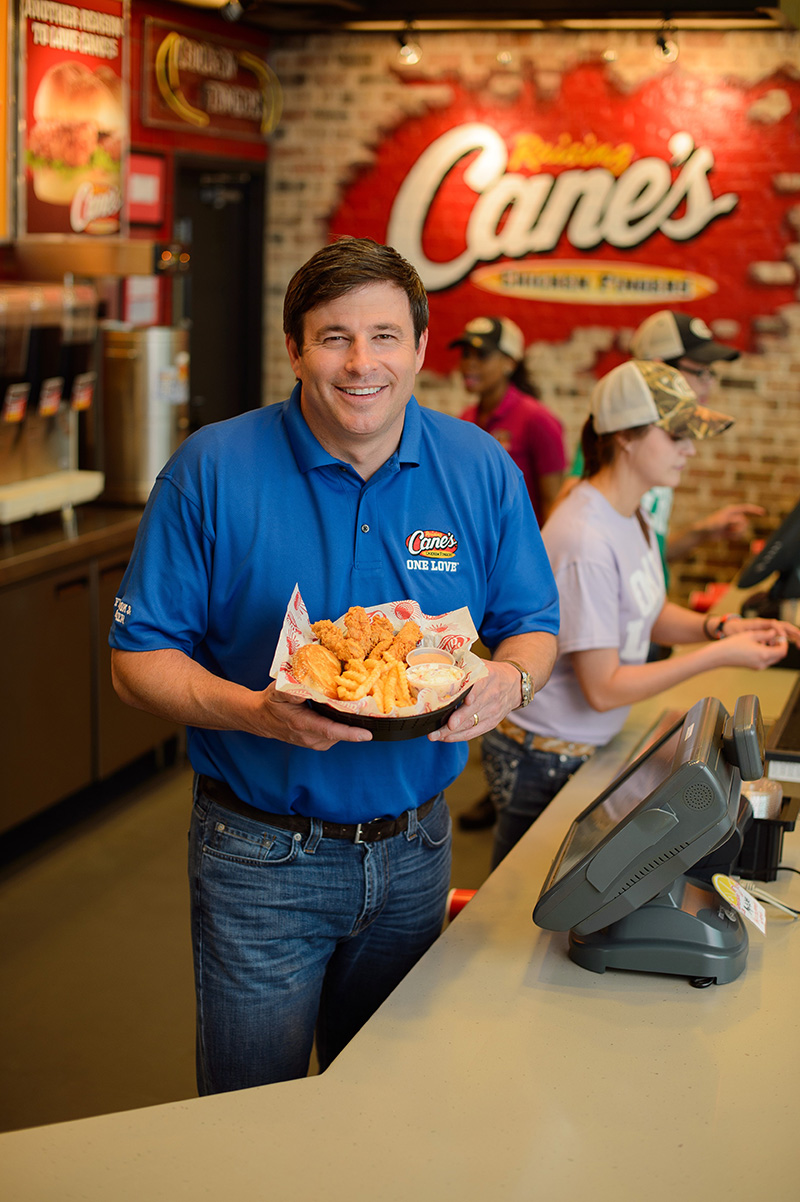
Todd Graves, Founder of Raising Canes.
Todd Graves, Founder, CEO, Fry Cook and Cashier, personifies the entrepreneurial spirit that Chapel Hill embodies — the promise that with dedication, drive, hard work and a great concept, dreams can be achieved.
Only 24 years old when he began his journey, Todd and his Crew have grown Raising Cane’s from a single campus restaurant to one of the fastest-growing large restaurant brands in the U.S.
When coming up with the name for his Restaurant in 1996, Todd originally planned to call it “Sockeye’s” after the salmon he fished in Alaska. Luckily, a friend suggested he name it after his yellow Labrador Retriever, Raising Cane, who accompanied Todd everywhere. Raising Cane III continues the legacy of Cane I and Cane II. She loves visiting Raising Cane’s Restaurants and receiving belly rubs from crewmembers.

Raising Cane III, the Lab tradition continues.
Maybe it was the entrepreneurial spirit or the staying power of Todd and Raising Cane’s that led Sloan to believe they could contribute to the spirit of Chapel Hill.
“They wanted to renovate the property with dignity and maintain the historic significance,” Mark says. “That’s important to us.”
It’s understandable that we would miss a place like Spanky’s in this space: it was a great restaurant. Memories were made there by generations of Tar Heels and tourists, and those memories are irreplaceable and forever. But the Brockwell Building was built 121 years ago. Often, it’s not change itself that costs the most money: the costs come from maintaining the past. The building was sold to Raising Cane’s in 2021, and the work on it has been ongoing ever since; it’s a thorough renovation, and one that promises to keep the Brockwell Building on the corner of Franklin and Columbia for decades to come.
Here’s to Raising Cane’s and their Grand Opening. They are set to open their doors on Tuesday, November 7, 2023.
See you there.
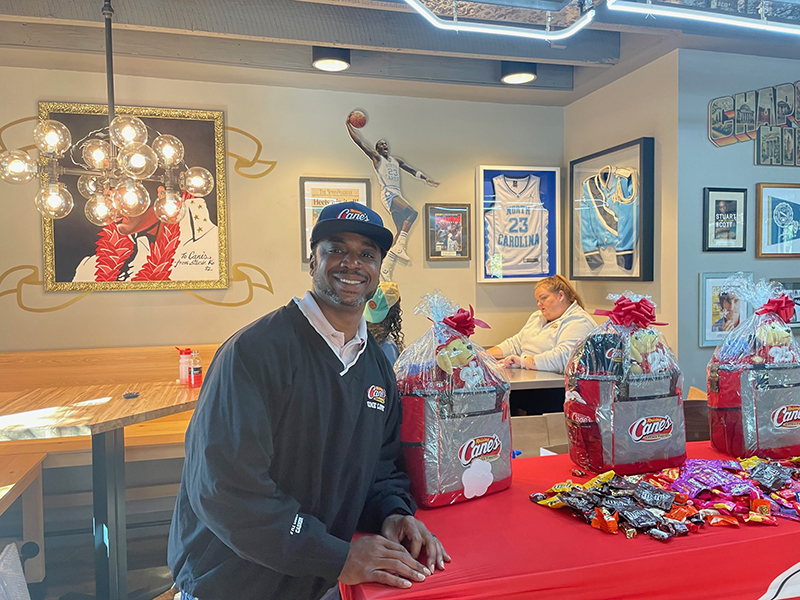
Jeremy Strayhorn, Restaurant Leader, Fry Cook & Cashier.
A Few Facts:
During demolition on the very first Raising Cane’s space, the founder uncovered an old mural behind a brick wall and used both the concept and style for his logo, now replicated in this fashion in every location.
The chicken tenders are made with chicken breast tenderloins that are fresh, never frozen, seasoned in marinade, hand dipped and breaded, and cooked to order in canola oil, never in advance.
All the combos pair a chosen number of fingers with fries, coleslaw and Cane’s Sauce, a secret recipe that is tangy and slightly spicy and the consistency of a creamy dressing like ranch. Fans who have reverse engineered it typically mix ketchup, mayo, Worcestershire sauce and spices.
For more info: https://raisingcanes.com/locations/c872
 Laurie Paolicelli is executive director for the Chapel Hill/Orange County Visitors Bureau, a position she has held since 2005. Laurie has worked in tourism and marketing for twenty-five years, having served in leadership roles in Houston and California convention and visitor bureaus. She is a native of the Twin Ports of Duluth, MN/Superior Wisconsin. She holds a Bachelor of Science degree in Business and Communications from the University Wisconsin-Superior and graduate certification in Technology In Marketing from the UNC-Chapel Hill’s Hussman School of Journalism and Media.
Laurie Paolicelli is executive director for the Chapel Hill/Orange County Visitors Bureau, a position she has held since 2005. Laurie has worked in tourism and marketing for twenty-five years, having served in leadership roles in Houston and California convention and visitor bureaus. She is a native of the Twin Ports of Duluth, MN/Superior Wisconsin. She holds a Bachelor of Science degree in Business and Communications from the University Wisconsin-Superior and graduate certification in Technology In Marketing from the UNC-Chapel Hill’s Hussman School of Journalism and Media.








